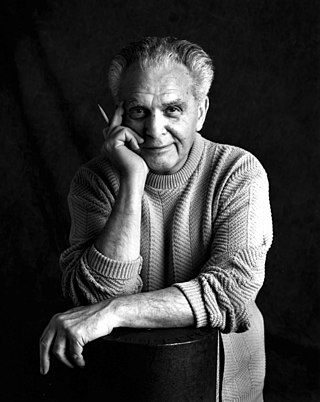
Jack Kirby was an American comic book artist, widely regarded as one of the medium's major innovators and one of its most prolific and influential creators. He grew up in New York City and learned to draw cartoon figures by tracing characters from comic strips and editorial cartoons. He entered the nascent comics industry in the 1930s, drawing various comics features under different pen names, including Jack Curtiss, before settling on Jack Kirby. In 1940, he and writer-editor Joe Simon created the highly successful superhero character Captain America for Timely Comics, predecessor of Marvel Comics. During the 1940s, Kirby regularly teamed with Simon, creating numerous characters for that company and for National Comics Publications, later to become DC Comics.

Sergio Aragonés Domenech is a Spanish-Mexican cartoonist and writer best known for his contributions to Mad magazine and creating the comic book Groo the Wanderer.

"Fourth World" is a metaseries of connected comic book titles written and drawn by Jack Kirby and published by DC Comics from 1970 to 1973. Although they were not marketed under this title until the August–September 1971 issues of New Gods and Forever People, the terms Fourth World and Jack Kirby's Fourth World have gained usage in the years since. Kirby created the Fourth World concept in the 1970s. The series is a science-fiction based mythology that revolves around ancient space deities known as the New Gods. The New Gods are similar to the gods of Earth lore.

Mark Stephen Evanier is an American comic book and television writer, known for his work on the animated TV series Garfield and Friends and on the comic book Groo the Wanderer. He is also known for his columns and blog News from ME, and for his work as a historian and biographer of the comics industry, such as his award-winning Jack Kirby biography, Kirby: King of Comics.

Joseph Henry Simon was an American comic book writer, artist, editor, and publisher. Simon created or co-created many important characters in the 1930s–1940s Golden Age of Comic Books and served as the first editor of Timely Comics, the company that would evolve into Marvel Comics.
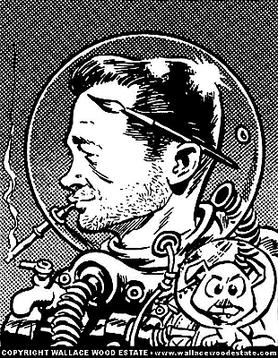
Wallace Allan Wood was an American comic book writer, artist and independent publisher, widely known for his work on EC Comics's titles such as Weird Science, Weird Fantasy, and MAD Magazine from its inception in 1952 until 1964, as well as for T.H.U.N.D.E.R. Agents, and work for Warren Publishing's Creepy. He drew a few early issues of Marvel's Daredevil and established the title character's distinctive red costume. Wood created and owned the long-running characters Sally Forth and Cannon.
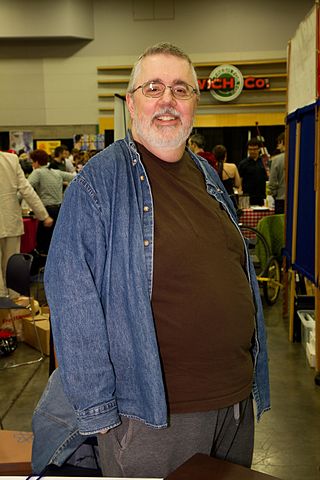
Kurt Busiek is an American comic book writer. His work includes the Marvels limited series, his own series titled Astro City, a four-year run on The Avengers, Thunderbolts, and Superman.

Nelson Alexander Ross is an American comic book writer and artist known primarily for his painted interiors, covers, and design work. He first became known with the 1994 miniseries Marvels, on which he collaborated with writer Kurt Busiek for Marvel Comics. He has since done a variety of projects for both Marvel and DC Comics, such as the 1996 miniseries Kingdom Come, which he also cowrote. Since then he has done covers and character designs for Busiek's series Astro City, and various projects for Dynamite Entertainment. His feature film work includes concept and narrative art for Spider-Man (2002) and Spider-Man 2 (2004), and DVD packaging art for the M. Night Shyamalan film Unbreakable (2000). He has done covers for TV Guide, promotional artwork for the Academy Awards, posters and packaging design for video games, and his renditions of superheroes have been merchandised as action figures.

Philip Craig Russell is an American comics artist, writer, and illustrator. His work has won multiple Harvey and Eisner Awards. Russell was the fourth mainstream comic book creator to come out as openly gay, following Andy Mangels in 1988, Craig Hamilton in 1989, and Eric Shanower in 1990.

Alfonso Williamson was an American cartoonist, comic book artist and illustrator specializing in adventure, Western, science fiction and fantasy.
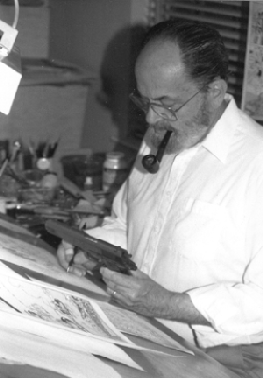
John Powers Severin was an American comics artist noted for his distinctive work with EC Comics, primarily on the war comics Two-Fisted Tales and Frontline Combat; for Marvel Comics, especially its war and Western comics; and for his 45-year stint with the satiric magazine Cracked. He was one of the founding cartoonists of Mad in 1952.
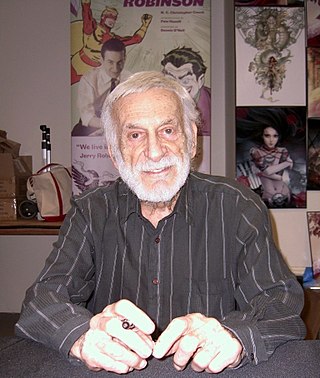
The Bill Finger Award for Excellence in Comic Book Writing is an American award for excellence in comic book writing. The awards committee, chaired by Mark Evanier, is charged each year with selecting two recipients, one living and one deceased. In 2020 due to the COVID-19 pandemic there were six deceased honorees and no living ones. 2021 saw the same formula as the previous year, with six deceased recipients.

Vincent Colletta was an American comic book artist and art director. He was one of Jack Kirby's frequent inkers during the 1950s-1960s Silver Age of comic books. This included some significant early issues of Marvel Comics' Fantastic Four, and a long, celebrated run on the character Thor in Journey into Mystery and The Mighty Thor.
A script is a document describing the narrative and dialogue of a comic book in detail. It is the comic book equivalent of a television program teleplay or a film screenplay.
"Charles Nicholas" is the pseudonymous house name of three early creators of American comic books for the Fox Feature Syndicate and Fox Comics: Chuck Cuidera (1915–2001), Jack Kirby (1917–1994), and Charles Wojtkoski (1921–1985). The name originated at Eisner & Iger, one of the first comic book packagers that created comics on demand for publishers entering the new medium during the 1930s–1940s Golden Age of comic books. The three creators are listed in order of birth year, below.

DC Graphic Novel is a line of graphic novel trade paperbacks published from 1983 to 1986 by DC Comics.

Boys' Ranch is a six-issue American comic book series created by the veteran writer-artist team of Joe Simon and Jack Kirby for Harvey Comics in 1950. A Western in the then-prevalent "kid gang" vein popularized by such film series as "Our Gang" and "The Dead End Kids", the series starred three adolescents—Dandy, Wabash, and Angel—who operate a ranch that was bequeathed to them, under the adult supervision of frontiersman Clay Duncan. Supporting characters included Palomino Sue, Wee Willie Weehawken, citizens of the town Four Massacres, and various Native Americans, including a fictional version of the real-life Geronimo.
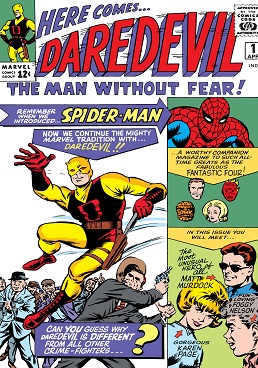
Daredevil is the name of several comic book titles featuring the character Daredevil and published by Marvel Comics, beginning with the original Daredevil comic book series which debuted in 1964.
Library of American Comics is an American publisher of classic American comic strips collections and comic history books, founded by Dean Mullaney and Bruce Canwell in 2007.

















